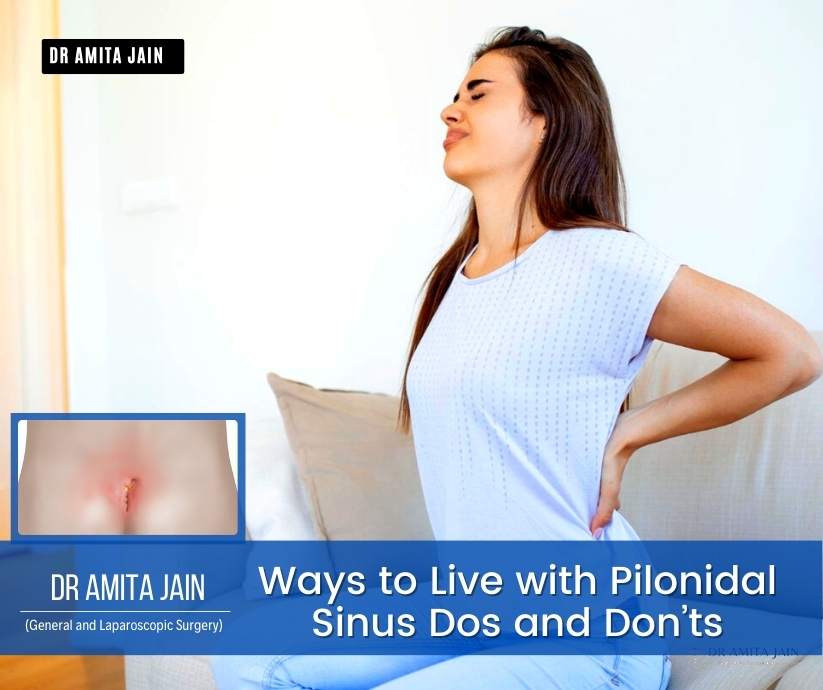A pilonidal sinus or cyst happens on the tailbone near the crease between your buttocks. Living with a pilonidal cyst on the lower back can be painful and uneasy. The earlier you identify and respond to its symptoms, the shorter you will have to live with a pilonidal sinus. Not getting immediate treatment in the earlier stages might make it worse and more problematic says Dr Amita Jain.
Delhi’s top laparoscopic surgeon for pilonidal sinus Dr Amita Jain shares some dos and don’ts to living with pilonidal sinus.
Dos – Here are some dos
Maintain good hygiene: Maintaining good hygiene is always important. However, it becomes even more crucial when you have a pilonidal sinus. Make sure to keep your buttock region clean and dry to avoid any risk of infections. Clean the area using mild soap daily and rinse the soap with water. Do not use harsh soaps as they might irritate the pilonidal sinus.
Wear comfortable clothes: Wearing tight clothes and undergarments might rub against the cyst and cause more irritation. Thus, you should wear loose-fit and comfortable clothes to minimize the contact between your skin and clothes.
Take sitz baths: Taking sitz baths and Epsom salt baths are good ways of draining pus from the infected pilonidal sinus. Add 3 to 4 teaspoons of Epsom salt to a bath with warm water and sit in it for about 20 minutes. It will help drain the cyst and soothe your pain, itching, and irritation.
Apply hot compresses: Applying hot, wet compresses to the pilonidal sinus could help drain the cyst, relieving pain and itching. Make certain to apply hot compresses a few times every day.
Use depilatory creams: The most common reason for pilonidal sinus is loose hair penetrating the skin. This is why you should remove the hair in the buttock region with depilatory creams to prevent more hair from penetrating your skin. Discuss the side effects of hair removal creams with your doctor prior to using them.
Take the prescribed medications: If a pilonidal sinus is in the initial stages, the doctor might prescribe antibiotics to prevent it from becoming infected and pain relievers to manage pain. Make certain to take proper doses of these medications.
Don’t – Here are things you need to avoid.
Do not sit for continuous long hours in one position: Sitting for long continuous hours is a top risk factor for pilonidal sinus. It lets sweat and other particles to gather in the buttock region. These particles could lead to infection in the pilonidal sinus if they enter your skin pits.
Do not put pressure on your buttocks: Keep your buttocks free of pressure as much as you can. Pressure and friction can push more hair into the skin pit, eventually, worsening the condition.
Avoid engaging in rigorous exercises and lifting heavy weights: You should avoid strenuous exercises as these might strain your buttocks, worsening the pain and discomfort caused by a pilonidal cyst.
Do not pop the cyst: Since a pilonidal cyst is similar to a pimple, you might get tempted to pop the cyst using your fingers. Though you may get rid of the pus, you will not be able to remove hair and other debris. It might also pose a risk of infection or scarring.
In mild cases of pilonidal sinus, warm compresses, and sitz baths paired with medicines could be effective methods to cure the cyst. However, you might need surgical intervention when the pilonidal sinus is severe and painful. Specific precautions after pilonidal sinus surgery should be followed to minimize the risk of infections and complications.
If you doubt or you are suffering from pilonidal sinus, then you may contact Delhi’s leading surgeon for pilonidal sinus Dr Amita Jain. Dr. Jain is one of the most experienced surgeons in the Delhi NCR region for pilonidal sinus.

Dr Amita Jain is one of India’s most distinguished and experienced senior surgeons who has conducted more than 1,00,000 successful surgeries, and has covered a wide spectrum of general and minimally invasive procedures. Dr Amita Jain is refered as the pioneer surgeon in the fields of Gallbladder stone removal surgery, appendix removal surgery, hernia repair surgery, Pilonidal Sinus treatments, varicose vein and piles surgery, fistula surgery and fissure surgeries.
With an outstanding career spanning over 29 years, Dr Amita Jain has earned her place among the top General and Laparoscopic surgeons in Delhi and India, known for her precision, compassion, and consistent surgical excellence. She was the Professor of Surgery at the Army College of Medical Sciences and Base Hospital, Delhi Cantt. In 1994, she was commissioned as a surgeon under the United Nations Mission in Congo.
Dr Amita Jain currently serves as the Head of Department and Senior Consultant for General, Laparoscopic and Trauma Surgery at Artemis Lite Hospital, Rosewalk – Luxury Maternity Hospital in Delhi (Panchsheel Park, Delhi) and Rainbow Children Hospitals (Malviya Nagar, Delhi).
